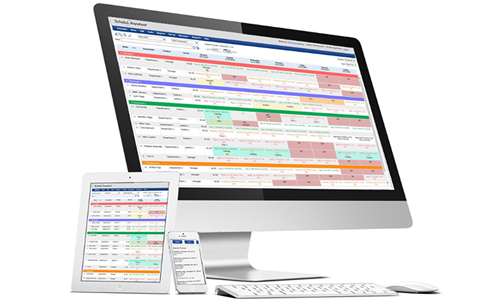Campus safety managers have a lot on their plates. From recruiting and training officers and guards to coordinating meetings and responding to emergencies, their list of duties is extensive. Of these, ensuring adequate shift coverage to meet campus facilities’ security requirements is one of the most critical. It also can be one of the most time consuming. Building campus security schedules is a laborious process. Factor in no-shows and other unforeseen absences, and managing security staff schedules can become downright exhausting.
Managers and supervisors often spend hours making phone call after phone call to fill open shifts. To combat this, many hospitals, schools and universities are implementing online scheduling software to manage their safety departments’ employee schedules. This ensures each shift is properly covered and frees up managers’ time so they can focus on other core responsibilities.
While there are several scheduling software options, managers should consider each system’s capabilities to determine whether it will help them reduce the time spent on scheduling and ensure the right people are scheduled in the right time and place. Here are four things to look for when selecting scheduling software to fit your campus safety department’s unique requirements.
- Does it open the lines of communication? When an unforeseen absence occurs, the resulting open shift needs to be covered quickly. Software that includes an integrated messaging system that allows managers to text or email available and qualified individuals or groups of employees facilitates prompt communication. For optimal accessibility and efficiency, safety departments should consider software that includes a mobile app, which some companies offer at no additional cost.
- Does it cover all the bases? Many campus safety personnel work in multiple departments or locations. Some scheduling software allows managers to share schedules across the entire organization, so changes to the schedule are immediately available to officers, administration and support staff. This not only gives everyone access to real-time data, it also shows managers how many total hours are scheduled, which can help reduce unnecessary overtime.
- Does it have your back? Campus safety department managers must ensure each shift is accurately covered in compliance with applicable rules and regulations. Administrators should look for scheduling software that tracks skills, training and certifications. When a shift needs to be filled, managers can quickly identify and notify only properly qualified personnel. For added security, some software alerts managers when certifications are nearing expiration.
- Does it take the load off managers? The least time-consuming way managers can be certain shifts are covered is to give officers the tools to handle it themselves. Scheduling software that allows employees to submit swap and cover requests online makes it easy for them to find another employee to trade or pick up a shift. To ensure there are no scheduling conflicts and that shifts are properly covered, look for software that notifies managers of schedule requests and allows them to approve or deny each request prior to any schedule changes.
Hundreds of public safety departments have discovered the benefits of online officer and staff scheduling software. Beyond saving time developing the initial schedule, the software takes the hassle out of filling open shifts and ensuring proper coverage, so managers have more time to focus on day-to-day operations.
Click here to learn how ScheduleAnywhere works for campus safety departments’ unique scheduling requirements.













